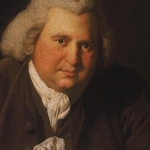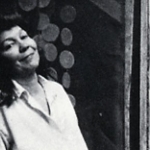After you left me forever,
I was broken into pieces,
and all the pieces flung into the river.
Then the legs crawled ashore
and aimlessly wandered the dusty cow-track.
They became, for a while, a simple roadside shrine:
A tiny table set up between the thighs
held a dusty candle, weed-and-fieldflower chains
placed reverently there by children and old women.
My knees were hung with tin triangular medals
to cure all forms of hysterical disease.
After I died forever in the river,
my torso floated, bloated in the stream,
catching on logs or stones among the eddies.
White water foamed around it, then dislodged it;
after a whirlwind trip, it bumped ashore.
A grizzled old man who scavenged along the banks
had already rescued my arms and put them by,
knowing everything has its uses, sooner or later.
When he found my torso, he called it his canoe,
and, using my arms as paddles,
he rowed me up and down the scummy river.
When catfish nibbled my fingers he scooped them up
and blessed his reusable bait.
Clumsy but serviceable, that canoe!
The trail of blood that was its wake
attracted the carp and eels, and the river turtle,
easily landed, dazed by my tasty red.
A young lad found my head among the rushes
and placed it on a dry stone.
He carefully combed my hair with a bit of shell
and set small offerings before it
which the birds and rats obligingly stole at night,
so it seemed I ate.
And the breeze wound through my mouth and empty sockets
so my lungs would sigh, and my dead tongue mutter.
Attached to my throat like a sacred necklace
was a circlet of small snails.
Soon the villagers came to consult my oracular head
with its waterweed crown.
Seers found occupation, interpreting sighs,
and their papyrus rolls accumulated.
Meanwhile, young boys retrieved my eyes
they used for marbles in a simple game
till somebody’s pretty sister snatched at them
and set them, for luck, in her bridal diadem.
all eyes, he crossed himself in horror,
and stumbled away in haste
through her dowered meadows.
What then of my heart and organs,
my sacred slit
which loved you best of all?
They were caught in a fisherman’s net
and tossed at night into a pen for swine.
But they shone so by moonlight that the sows stampeded,
trampled one another in fear, to get away.
And the fisherman’s wife, who had thirteen living children
and was contemptuous of holy love,
raked the rest of me onto the compost heap.
Then in their various places and helpful functions,
the altar, oracle, offal, canoe and oars
learned the wild rumor of your return.
The altar leapt up, and ran to the canoe,
scattering candle grease and wilted grasses.
Arms sprang to their sockets, blind hands with nibbled nails
groped their way, aided by loud lamentation,
to the bed of the bride, snatched up those unlucky eyes
from her discarded veil and diadem,
and rammed them home. Oh, what a bright day it was!
This empty body danced on the riverbank.
Hollow, it called and searched among the fields
for those parts that steamed and simmered in the sun,
and never would have found them.
But then your great voice rang out under the skies
my name!—and all those private names
for the parts and places that had loved you best.
And they stirred in their nest of hay and dung.
The distraught old ladies chasing their lost altar,
and the seers pursuing my skull, their lost employment,
and the tumbling boys, who wanted the magic marbles,
and the runaway groom, and the fisherman’s thirteen children
set up such a clamor, with their cries of “Miracle!”
that our two bodies met like a thunderclap
in midday—right at the corner of that wretched field
with its broken fenceposts and startled, skinny cattle.
We fell in a heap on the compost heap
and all our loving parts made love at once,
while the bystanders cheered and prayed and hid their eyes
and then went decently about their business.
And here it is, moonlight again; we’ve bathed in the river
and are sweet and wholesome once more.
We kneel side by side in the sand;
we worship each other in whispers.
But the inner parts remember fermenting hay,
the comfortable odor of dung, the animal incense,
and passion, its bloody labor,
its birth and rebirth and decay.




Comment form: